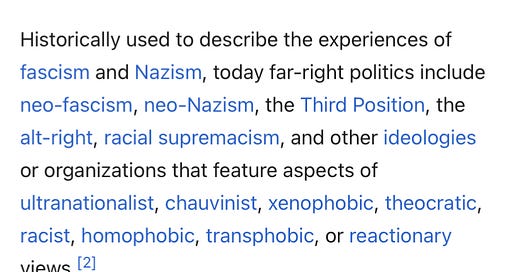When we talk about the protests
In November 2021 a “poll on the social media app Telegram claimed that 98% of New Zealanders want Jacinda Ardern removed from office and asked what her punishment should be. The leading option was hanging, with people also calling for a firing squad or public stoning.”
In February 2022, protesters wrote “hang 'em high" on the forecourt of Parliament, chanting those words.
Let’s be clear that if you are proposing to lynch people as your argument, you have lost it already and are instead advocating for violence.
When we talk about the convoy protests, if we are not talking about disinformation, misogyny, white supremacy and the influence of far-right groups in other countries then we need to talk to, and amplify, the experts working in these spaces who have been sounding the alarm for years.
When we talk about these protests, we need to talk about the misogyny consistently directed towards Prime Minister Jacinda Ardern and others - from opinion articles to tweets to comments sections.
We need to talk about it, because “when democratically elected members are being threatened on the basis of their gender, not only online, but in person too, it has clear dire implications for the health of democracy.”
We need to talk about it, because New Zealand has the worst rate of domestic violence in the OECD. We need to talk about it because 1 in 3 New Zealand women have experienced physical and/or sexual intimate partner violence in their lifetime. We need to talk about it because 1 in 3 girls are sexually abused before age 16.
“Studies have found that anti-women attitudes are the biggest predictors of attitudes of violent extremism, and this is true for far-right groups as well.”
When we talk about the protests, if we are not talking about the overt and implicit permission that has been given to dangerous views (and I’m sure we can all think of examples from the last two years), we should challenge ourselves to think about why that behaviour is normalised or not held to account.
The January 6th Insurrection in the United States has been reported as inspiring the trucker convoys - with some clear differences.
On January 6th, “one of the reputed masterminds of the entire operation was Trump advisor and strategist Steve Bannon, a far-right ideologue who peppers his language with violent, militaristic rhetoric.”
It is concerning to see that his reach extends to New Zealand.
Dog whistling, conspiracy theories, tribalism gives connection and purpose to those who are fearful of perceived loss, who may feel an uneasiness with giving up power, for whom “equality feels like oppression.”
It’s entitlement to a world that doesn’t exist, stoked by people with agendas which also include misogyny and racism.
When we talk about the protests, we should consider that people who are “other” are the first targets for those types of people when in power.
When we talk about the protests, we should consider what’s occurring at the base of these pyramids in policy, in our day to day lives.
When we talk about the protests, let’s try to avoid the #notallprotestor discussion - because it’s enough protestors that we should talk about it - again, especially with experts who know this complex world far better than those of us who have been watching the news this week, and feeling like all of this has come on quite suddenly.
We should know that these protests will continue, and that protest is critical to a functioning democracy.
How we talk about them will be critically important in the months to come.




